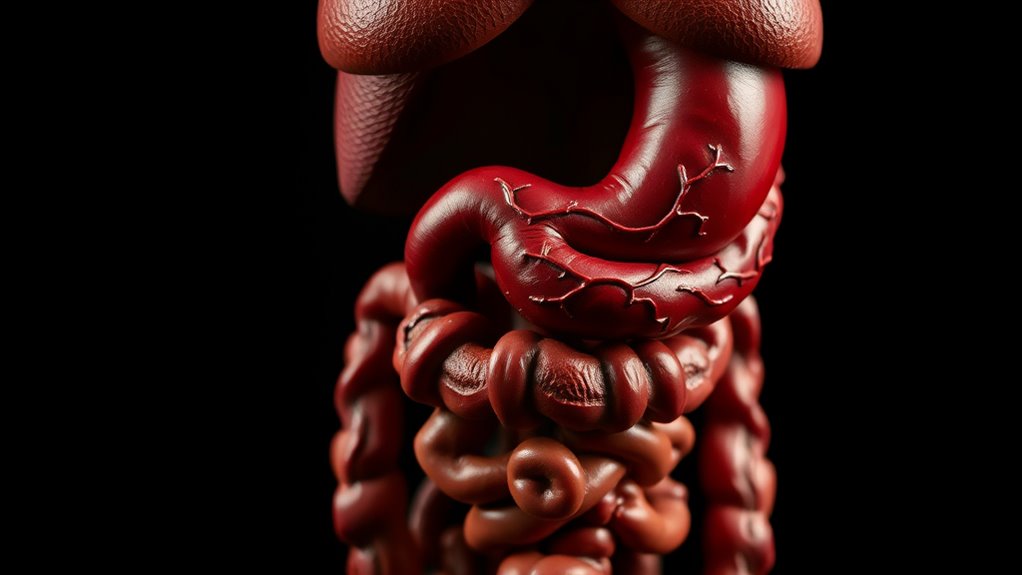The digestive system impacts your overall health by influencing nutrient absorption and even mental clarity. Factors like diet, hydration, and stress levels can greatly affect gut function. For example, increased fiber and hydration can improve digestion, while stress can disrupt it, potentially leading to disorders like IBS. Maintaining a healthy gut is essential for well-being. Discovering the links between digestive health and other aspects of life can help you improve your overall wellness.
Key Takeaways
- The digestive system, about 30 feet long, plays a crucial role in nutrient absorption and overall health.
- Stress can significantly disrupt digestion, leading to conditions like IBS and increased gut sensitivity.
- A balanced diet rich in fiber and probiotics promotes beneficial gut bacteria and reduces inflammation.
- Hydration and regular physical activity support gut motility and enhance digestive function.
- Digestive disorders, such as constipation and IBS, can cause symptoms like abdominal pain, bloating, and changes in bowel habits.
Understanding the Digestive System

The digestive system is a remarkable network that plays an essential role in your overall health. It includes the gastrointestinal tract, stretching about 30 feet from your mouth to your large intestine, efficiently breaking down food.
Digestion starts with saliva and involves processes like peristalsis that propel food through this intricate system. Your gut, known as the “second brain,” contains numerous nerves that connect to your nervous system, influencing both gut health and emotional well-being.
However, digestive disorders such as abdominal pain, constipation, or diarrhea can disrupt this balance.
To maintain ideal digestive health, focus on increasing your fiber intake, staying hydrated, and engaging in regular physical activity. These practices support gut function and enhance your overall well-being.
The Role of the Gut in Overall Health

Gut health substantially influences your overall well-being, impacting everything from digestion to mental health.
The gut-brain connection shows how emotional stress can disrupt digestive health, often triggering conditions like irritable bowel syndrome (IBS).
By maintaining a balanced diet rich in fiber, fruits, and vegetables, you promote the growth of beneficial gut bacteria, vital for digestion and immune function.
Incorporating probiotics and prebiotics enhances gut microbiome diversity, leading to improved digestive health and reduced inflammation.
Regular physical activity complements these efforts, supporting both gut function and mental health.
Prioritizing your gut health is essential, as it plays a significant role in your overall well-being, connecting physical and emotional aspects of your life.
Common Digestive Disorders and Their Symptoms

Digestive disorders can considerably impact your daily life, often leading to discomfort and frustration.
Common GI problems include constipation, where you might experience infrequent or difficult bowel movements. Increasing your water and fiber intake can help alleviate this issue.
Constipation, characterized by infrequent or difficult bowel movements, can often be managed by increasing water and fiber intake.
Irritable bowel syndrome (IBS) causes irregular intestinal contractions, resulting in symptoms like abdominal pain and bloating, often requiring dietary changes for management.
You might also face hemorrhoids, which are swollen veins in the anal area that can cause bleeding and discomfort during bowel movements.
Diverticular disease leads to pouches in the large intestine and may result in inflammation or infection.
Finally, colorectal cancer can start as benign polyps, presenting symptoms such as changes in bowel habits and unexplained weight loss, making early detection vital for your health.
How Stress Affects Digestion

When you’re stressed, your body triggers the “fight or flight” response, which can shut down digestion and lead to discomfort.
Chronic stress can throw your digestive system out of balance, causing issues like constipation or diarrhea.
Understanding how stress impacts your gut is key to managing your overall digestive health.
Stress Response Mechanism
Stress can greatly disrupt your body’s normal functioning, particularly affecting how you digest food. The stress response triggers the sympathetic nervous system, prioritizing fight or flight over digestive processes. This inhibition slows down muscle contractions in the gastrointestinal (GI) tract, leading to issues like irritable bowel syndrome (IBS) or ulcers.
Chronic stress elevates cortisol levels, altering gut motility and increasing intestinal permeability, which can cause inflammation and discomfort. Your gut, home to the enteric nervous system, communicates with your brain, amplifying pain sensations during stress.
To counteract these effects, relaxation techniques like yoga and mindful breathing activate the parasympathetic nervous system, promoting a “rest and digest” state that enhances your digestive function.
Chronic Stress Consequences
Chronic stress can wreak havoc on your digestive system, leading to a cascade of negative effects. When you experience prolonged stress, your body’s fight-or-flight response kicks in, suppressing digestive processes and slowing gastrointestinal contractions.
This disruption can result in digestive disorders like irritable bowel syndrome (IBS) and ulcers, causing symptoms such as nausea and abdominal pain. Additionally, stress-related hormones can upset the balance of gut bacteria, leading to dysbiosis and further complications.
To counteract these effects, incorporating mindfulness practices like yoga and meditation can activate the relaxation response, promoting better digestion. By managing chronic stress, you can support your digestive health and alleviate stress-induced issues effectively.
Strategies for Supporting Digestive Health

To support your digestive health effectively, it’s crucial to adopt a holistic approach that encompasses diet, exercise, and lifestyle choices.
Start by increasing your fiber intake through fruits, vegetables, and whole grains to promote gut health and prevent digestive issues like constipation and IBS.
Boost your digestive health by increasing fiber intake through fruits, vegetables, and whole grains to combat issues like constipation and IBS.
Stay hydrated to aid digestion and consider incorporating probiotics from sources like kefir and kimchi to enhance your gut microbiome.
Regular physical activity, blending aerobic and strength training, can also improve gut motility.
Don’t underestimate the power of stress management; techniques such as mindfulness and yoga can greatly benefit your digestive function.
Finally, keep a food symptom journal to pinpoint triggers and tailor your diet to your individual needs.
The Importance of Mental Health in Digestive Function

While you might not realize it, your mental health plays an essential role in how your digestive system functions. Emotional states like anxiety and stress can directly impact gastrointestinal function, causing issues such as abdominal pain and nausea. Chronic stress inhibits digestion, potentially leading to irritable bowel syndrome (IBS).
Here’s a quick overview of how mental health affects digestive health:
| Factor | Impact on Digestive Function |
|---|---|
| Anxiety | Increases sensitivity to pain |
| Stress | Slows muscle contractions |
| Mental Health Support | Improves overall digestive health |
| Cognitive Behavioral Therapy | Alleviates digestive symptoms |
| IBS | Linked to stress and emotions |
Addressing mental health through therapy can markedly improve your digestive function and overall well-being. Additionally, incorporating mindfulness practices can enhance self-awareness and further support digestive health.
Frequently Asked Questions
What Is the Impact of the Digestive System?
The digestive system’s impact is vital for your overall health. It processes food and liquids, absorbing essential nutrients that fuel your body. If it’s functioning well, you’ll feel energized and healthy.
However, if you neglect it with poor diet or stress, you might experience discomfort. Maintaining a balanced diet rich in fiber and managing stress can help keep your digestive system in check, ensuring you feel your best every day.
What Diseases Have an Impact on the Digestive System?
Isn’t it ironic how something as simple as eating can lead to a plethora of diseases? You mightn’t think about it, but conditions like irritable bowel syndrome (IBS) and inflammatory bowel disease (IBD) can wreak havoc on your gut.
Then there’s gastroesophageal reflux disease (GERD), which turns meals into heartburn nightmares.
And don’t forget celiac disease, where gluten becomes an enemy, wreaking havoc on your small intestine and overall health.
What Are 4 Common Problems With the Digestive System?
You might encounter several common digestive problems.
First, constipation could make your bowel movements infrequent or difficult.
Then, you may experience irritable bowel syndrome (IBS), which brings abdominal pain and bloating.
Gastroesophageal reflux disease (GERD) can cause persistent heartburn, making meals uncomfortable.
Finally, diverticular disease may lead to small pouches in your colon, which can become inflamed or infected.
Understanding these issues can help you manage your digestive health better.
What Factors Can Affect the Digestive System?
Several factors can affect your digestive system. Your diet plays an essential role; low fiber intake can lead to issues.
Stress can disrupt your digestion by triggering the fight-or-flight response, causing discomfort. Lack of physical activity can slow down digestion, while poor sleep quality might contribute to weight gain, impacting your gut health.
Additionally, emotional factors like anxiety can worsen gastrointestinal problems, making it vital to maintain both physical and mental well-being.
Conclusion
In summary, taking care of your digestive system is as essential as maintaining a well-tuned orchestra; each part needs to function harmoniously for your overall health. By understanding how stress and mental well-being impact digestion, you can implement effective strategies to support your gut. Remember, a balanced diet, stress management, and attention to mental health can help keep your digestive system performing at its best, allowing you to enjoy life with energy and ease.










